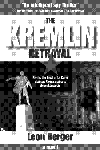
The Kremlin Betrayal
Leon Berger
Loon in Balloon Publishing
$19.95
paper
296pp
978-0-9737497-5-5
Because of this defection the raid is foiled, and Lina Von Osten, widow of the Nazi Reinhard Heydrich, escapes with the manuscript. She is helped by Reinhard Gehlen and his men, former Nazis who remain loyal to their fallen leaders. Meanwhile, back in Moscow, Stalin – portrayed as suffering from frightening mood swings fuelled by alcoholic rages – puts pressure on Lavrenti Beria to find the missing manuscript.
By the middle of the book, not only are the Soviets, the Germans, ex-Nazis, the British Secret Service and its moles (Kim Philby and his ilk) involved, but also Konrad Adenauer, Nikita Kruschev (described as “verbose and bombastic, with a bald head and a squat, wrestler’s physique”), Harry Truman, and the American spy network. The manuscript, and the secret it contains, could do a lot of damage if it fell into the wrong hands – and the wrong hands are reaching for it greedily. There are nail-biting escapes and muddled loyalties. The inclusion of historical figures adds to the plausibility of Berger’s alternate universe of Cold War intelligence and counter-intelligence. And the other, fictional, characters are so well-rounded that it is tempting to think they are historical as well.
The protagonist, Schaeffer, is a believable middle-aged man who is unwillingly mixed up in world affairs, and, unlike James Bond, would much rather go home to Ontario than chase criminals. Schaeffer’s on again-off again love interest is Katharina Vollbrecht, an aristocratic and idealistic woman who cares, perhaps too much, about bringing war criminals to justice. Whether these two star-crossed lovers can find peace in post-WWII Europe, when the Cold War is raging, is open to question. It is to Berger’s credit that we care about Schaeffer and Katharina, and hope that there will be some form of ultimate happy ending.
Loon in Balloon is a young publishing house in Kitchener, Ontario which takes on manuscripts that lend themselves to being turned into screenplays. The Kremlin Betrayal certainly fits the bill: it is extremely cinematic. Part of the fun of reading this thriller is mentally casting the actors for the film. This is an intelligent thriller, history as it might have been. mRb






0 Comments